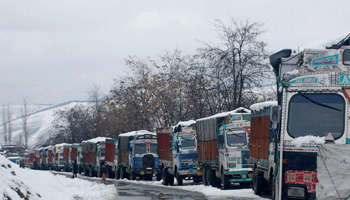New Delhi, May 19: The all-powerful Goods and Services Tax (GST) Council members will meet again meet in Srinagar on Friday take up the exemption of essential services.

Union Finance Minister Arun Jaitley expressed hope to finalise list of exempted items today and will also discuss rate of tax on gold and bidi.
Chaired by Jaitley, this is the first time that such an important national policy-making meet is being held in Jammu and Kashmir.
The GST Council yesterday finalised tax rates for bulk of the items. Foodgrains and common-use products like hair oil, soaps and toothpaste as also electricity will cost less from July 1 when the GST is scheduled to be rolled.
While the Council fitted all but six items in 5, 12, 18 or 28 percent tax brackets, cars will attract the top rate as also a cess in the range of 1 to 15 percent on top of it.
Small cars will be charged 1 percent cess on top of 28 percent tax, mid-sized and luxury cars will attract cess of 15 percent on top of the peak rate.
Aerated drinks too have been put in the 28 percent bracket along with a cess of 12 percent, but the rates for bidis along with gold, footwear, bidi, biscuits and agriculture equipments would be decided later.
While meat, fresh vegetables, honey, jaggery, prasadam, kumkum, bindi, pappad and contraceptives have been exempt from GST levy, items like pizza bread, sevaiya, condensed milk, frozen vegetables will attract 5 percent levy, as per the items list put on CBEC website late in night.
The Goods and Services Tax (GST) on coal has been brought down to 5 percent from the current tax incidence of 11.69 percent, thereby making electricity generation cheaper.
Common use products like hair oil, soaps and toothpaste will be charged with a single national sales tax or GST of 18 percent instead of present 22-24 percent tax incidence through a combination of central and state government levies.
ACs and refrigerators will fall in the 28 percent tax slab while life-saving drugs have been kept at 5 percent rate.
All capital goods and all industrial intermediaries would?attract 18 percent tax instead of 28 percent.
Milk and curd will continue to be exempt from taxation? when the GST replaced current indirect taxes. 'Mithai' or sweets will attract 5 percent levy.
Daily-use items like sugar, tea, coffee (barring instant coffee) and edible oil will attract the lowest tax rate of 5 percent, almost the same as current incidence.
While frozen meat will attract a GST of 12 percent, Ayurvedic or homeopathy medicines, agarbatti, umbrella, electric vehicles and mobile phone manufacturing will be taxed at 12 percent.
Pastries and cakes, pasta, ice cream and soups, instant food mixes, betel nut, vinegar and sharbat will attract a 18 percent tax, while the highest tax of 28 percent will be levied on chewing gum, chocolates, custard powder and waffles containing chocolate.
The two-day meeting is being attended by around 150 dignitaries, including finance ministers and finance secretaries of all the states.
The GST will be a national sales tax that will be levied on consumption of goods or use of services. It will replace 16 current levies -- seven central taxes like excise duty and service tax and nine state taxes like VAT and entertainment tax -- thereby creating India as one market with one tax rate.








Comments
Add new comment